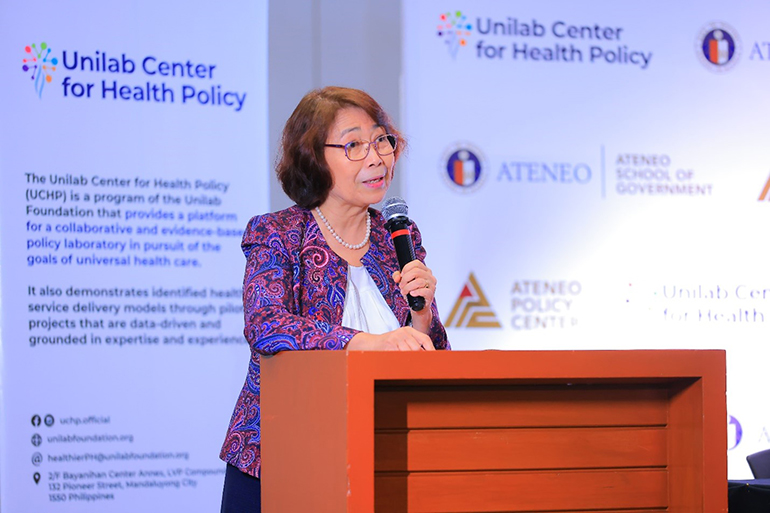In a bold move to reshape how local governments finance healthcare, Unilab Foundation (ULF) through the Unilab Center for Health Policy (UCHP) and Ateneo de Manila University (ADMU) have joined forces to deliver research-backed solutions to improve the fiscal performance of health budgets at the local level — an often overlooked but critical component in achieving Universal Health Care (UHC).
The partnership brings together Ateneo’s School of Government (ASoG) and UCHP, with technical collaboration with the Department of Budget and Management (DBM).
The study is the first of its kind to focus on optimizing local health spending under the UHC Law across local government units (LGUs).
During the ceremonial signing, Unilab Foundation Executive Director Atty. Jose Maria Ochave cited the broader purpose behind the agreement.
“Today is not just a ceremonial signing but a small step toward transforming local health governance in the country. We are happy and privileged to partner with the Ateneo School of Government and the Ateneo de Manila University,” he said.
The collaboration draws on the strengths of both institutions. UCHP has been working to close gaps in the UHC Law’s implementation, while ASoG trains leaders to tackle real-world problems through policy innovation and public accountability.
Together, they aim to combine data-driven policy work with ethical and evidence-based governance. But beyond the numbers and systems, both sides hope to spark a deeper shift in mindset — that good health is not just a policy goal, but a shared responsibility.
For Ochave, the mission is clear: this partnership must not only generate knowledge but also empower the institutions that can act on it.
Echoing this vision, Ateneo Vice-President for Higher Education, Dr. Maria Luz C. Vilches, highlighted a critical yet often overlooked issue: the role of budgeting in achieving health outcomes.

“This is very important as pointed out about the UHC Law; there’s a lot to do,” she said. “Our noble goal is health insurance, well-being — but we have to attend to the mundane things called budget and money.”
Vilches underscored the critical insight often missing in policy discussions: that realizing the promise of universal healthcare requires more than ideals — it demands willingness to deal with budgetary details head-on.
“Sometimes the lever does not move if you don’t touch the aspects of budget and money. I am happy that this project is going to move that lever,” she further explained.
Building on this, UCHP Program Director Ruben “John” Basa pointed to the depth and scope of their current work — and how it connects directly to this initiative.
“When you talk of local government, health financing and Ateneo, this is a small room of big ideas,” he said. “We want to research and demonstrate how the UHC Law can be implemented one LGU at a time.”
UCHP has already laid important groundwork. Last year, it completed four studies — two national and two local — on critical UHC reforms. These included a review of PhilHealth’s shift to a new provider payment mechanism, the rollout of the Konsulta outpatient package, and the development of a service delivery model for geographically isolated and disadvantaged areas (GIDA), which will be pilot-tested in Ormoc City.
Basa also shared findings from UCHP’s landmark 30-year review of national health accounts, a project that revealed stark contrasts in health financing trends.
“In 1992, the out-of-pocket spending of the Philippines was at 47%, Thailand was at 45%,” Basa said. “Fast-forward to 2023, the Philippines’ out-of-pocket spending went down to 45%, Thailand to 9.2%. They must be doing something good over there.”
The same study found that despite increased funding, local government spending on health was “falling to irrelevance.” That troubling trend only underscores the urgent need for reform — precisely what this new initiative seeks to address.

Closing the event, Philip Arnold Tuaño, Dean of ASoG, reinforced the critical role of industry leaders in strengthening public healthcare systems. He stressed the need for close monitoring of the fiscal performance of LGUs to ensure that every peso spent leads to tangible improvements in services and infrastructure.
According to Tuaño, the partnership with Unilab Foundation will also generate research and data that can guide both national and local decision-makers.
“Today formalizes a partnership with the common vision of pursuit of equitable, accessible, and effective healthcare for the Philippines,” Tuaño said.
Spotlight is BusinessWorld’s sponsored section that allows advertisers to amplify their brand and connect with BusinessWorld’s audience by publishing their stories on the BusinessWorld Web site. For more information, send an email to online@bworldonline.com.
Join us on Viber at https://bit.ly/3hv6bLA to get more updates and subscribe to BusinessWorld’s titles and get exclusive content through www.bworld-x.com.